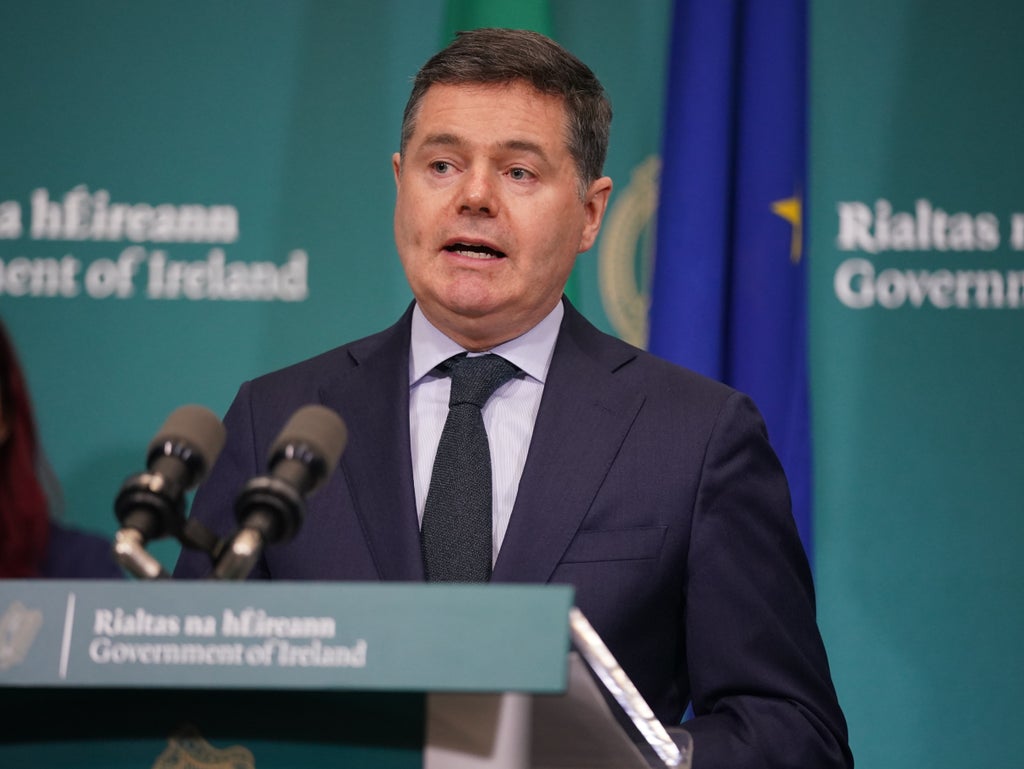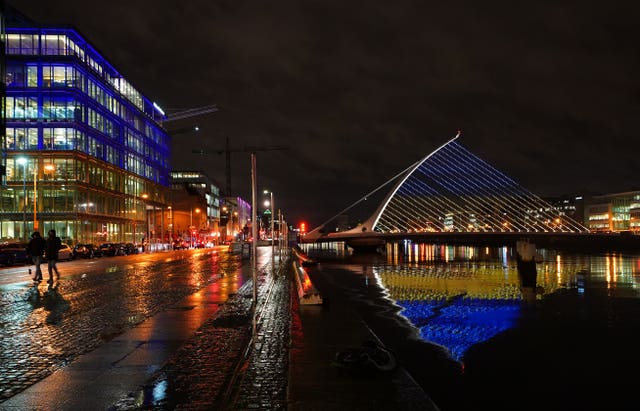
Ireland’s Minister for Finance said he expects further sanctions against Russia and those connected to Vladimir Putin to be announced in the coming days.
Paschal Donohoe said the European Commission is considering further steps in response to Russia’s aggression against Ukraine.
The Fine Gael minister said current measures against Russia are “undermining” or may stop the ability of the Russian economy to fund the “murderous war”.
“I would expect further sanctions with regard to the Russian economy to be developing in the coming days, if not today,” Mr Donohoe told RTE Morning Ireland.
 The Samuel Beckett Bridge in Dublin’s city centre displays the colours of the Ukrainian flag as a show of support. Almost 6,000 Ukrainians have arrived in Ireland (Brian Lawless/PA)/caption]
The Samuel Beckett Bridge in Dublin’s city centre displays the colours of the Ukrainian flag as a show of support. Almost 6,000 Ukrainians have arrived in Ireland (Brian Lawless/PA)/caption]
“The European Commission is currently considering what further steps can be taken.
“It should be said it is on top of the most comprehensive sanctions package ever introduced.
“The measures that have been brought in are, in effect, undermining or may indeed stop the ability of the Russian economy to fund this murderous war.
“And to see what has happened with the value of the ruble, that their stock markets are no longer functioning and that the central bank is now not able to access to foreign exchange reserves and needs to convert the ruble, it is a sign that what is in place at the moment has already had a huge effect, combined with the decisions that private sector companies all over the world are now making.
I think most of our focus will continue to be in how we implement what we've agreed, but I do expect further sanctions will be imposed.
“I think most of our focus will continue to be in how we implement what we’ve agreed, but I do expect further sanctions will be imposed.”
Mr Donohoe also said that the Government is not considering any further measures to mitigate against the rising cost of living and energy costs.
He also warned that the Government is not able to insulate the economy and businesses from higher costs.
Mr Donohoe said it will be reviewed in October’s budget.
“We will keep all of this under very active review. At the moment, and up to the budget which I will do in October, I and the government have no further plans to add to what we have just done,” he added.
“The reason for that is we’re still about to implement the measures that we have just agreed to.
“So the excise reduction last week between nine and 13 euros per tank of diesel and petrol, that has been implemented.
“For many that has been offset by the increase in the price of fuel that has happened since then.
“But the 125 euro payments that have been made to those who need additional support with the cost of fuel has just now been made to over 300,000 homes.
“The 200 euro credit that will appear in your energy bill is yet to be implemented, but will be implemented soon.
“The measures that we have put in place, we believe are a strong response back to the difficulty that many are facing, but I want to underline that given the challenge that is under way, we will not be able to insulate either economy, businesses or even ourselves from this entire cost.”
Meanwhile Ukrainian ambassador to Ireland Larysa Gerasko said that almost 6,000 Ukrainians have arrived in Ireland in recent weeks.
Ms Gerasko said those who she has spoken to are grateful for the “warm welcome” from Irish people.
“I met many of our Ukrainians, some of them came to the consulate,” she added.
“Our people, of course, they are frustrated, many of them came from the cities that are under shelling and firing.
“They got accommodation, PPS number, first aid. They have, of course, a lot of question on how to get education, how to register their kid to go school or kindergarten, how would you arrange to see a GP.
“It’s everyday things but it’s very difficult for them, especially (for those) who haven’t any relatives or friends here to understand how this system in foreign countries work.
“Many of them don’t speak English. So it’s also a problem but many people from the Ukrainian community here help our newcomers with the translation and many many other things.”
She said that while it is difficult to predict the number of refugees who will seek help in Ireland, she estimates it to be around 80,000 people.
She said that Ukrainians have been made aware that Ireland has waived its visa requirements.
“But many Ukrainians and even my friends, they don’t know that they don’t need a visa to get to Ireland,” Ms Gerasko added.
“So we will make an information campaign again in Ukrainian mass media. Of course I’m sure that many thousands will arrive.”







